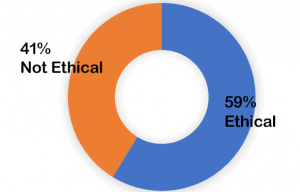This is the February 2020 edition of our monthly series of Ethics case studies titled What Do You Think? This series is comprised of case studies from NSPE archives, involving both real and hypothetical matters submitted by engineers, public officials and members of the public.
Your peers and the NSPE Board of Ethical Review have reviewed the facts of the case as shown below. And, here are the results.
A Review of the Facts
Jerry, a civil engineer, requires a broad indemnification provision in all of his agreements where he provides pollution-related services. Under the agreement, the client is required to “indemnify and hold harmless Jerry for any damages or legal costs (including attorney fees) arising from Jerry’s negligence in the performance of pollution-related services.” Jerry had inserted the indemnification provision during the time of the “liability crisis” because of the unavailability of pollution-related insurance coverage. In recent years, the insurance industry has re-entered the pollution insurance market and now provides limited pollution coverage for an additional premium.
Would it be ethical for Jerry to continue to require a broad indemnification provision in all of his agreements where he provides pollution-related services?
Here is the result of our survey of your peers:

Applicable NSPE Code References:
Code III.8.a: Engineers shall accept personal responsibility for their professional activities, provided, however, that engineers may seek indemnification for services arising out of their practice for other than gross negligence, where the engineer’s interests cannot otherwise be protected.
Discussion
A basic tenet of ethical conduct relates to the obligation of the engineer to accept responsibility for professional services that the engineer renders. This tenet is based upon the view that as a member of a learned profession, an engineer possesses skill, knowledge and expertise and is expected to use those attributes for the betterment of mankind. The law expects licensed engineers to perform professional services in a non-negligent manner. In addition, engineers are also expected to be personally liable for their acts, errors or omissions in the performance of their professional services.
The Board has not reviewed Code III.8 with great frequency. In BER Case 86-4, the Board considered a case involving the modification of signed and sealed plans by other than the responsible engineer. In reviewing the case, the Board cited Code III.8 and expressed concern that the engineer in that case failed to acknowledge responsibility for the full design by notations on the drawings. The Board indicated that this failure suggested a lack of recognition on the part of the engineer that his modifications in the design might have an impact on the efficacy and integrity of the entire project design. For that reason, we found the engineer unethical in that case. However, BER Case 86-4 was rendered before a significant change was made to Code III.8. Soon after BER Case 86-4 was issued, the Board of Ethical Review proposed an addition to Code III.8 which was adopted by the NSPE Board of Directors. That addition made the following revision:
“III.8. Engineers shall accept responsibility for their professional activities; provided, however, that Engineers may seek indemnification for professional services arising out of their practice for other than gross negligence, where the Engineer’s interests cannot otherwise be protected.”
This language was added to the NSPE Code of Ethics in response to the needs expressed by many practitioners at the height of the “liability crisis” during which many engineers were forced to practice with little or no professional liability insurance, or in some instances, as a condition of performing certain types of services (e.g., pollution and asbestos-related professional services) require clients to indemnify and hold the engineer harmless for the engineer’s professional errors and omissions. This change reflects the view stated by the Board on numerous occasions that the Code of Ethics is a living document that must be realistic and from time to time reflect changes that occur in the practice environment in order to maintain credibility and currency.
Since the modification was made to Code III.8 of the Code of Ethics, most major professional liability insurers in the US today have reentered the A/E professional liability insurance market and many now offer some type of limited coverage for both pollution and asbestos-related services. For that reason, consistent with the intent of Code III.8 and the intent of the changes made to Code III.8 during the height of the “liability crisis”, we believe there is a need to further amplify the extent to which engineers should appropriately avail themselves of the scope of Code III.8.
In our view, Code III.8 should be read in the context of indemnification to mean that an engineer has an obligation to accept responsibility for professional activities and, where appropriate, obtain professional liability or other protection for the benefit of the engineer’s client to the extent that such professional liability or other protection are available either on the market or in other spheres. We are mindful that the cost and scope of professional liability insurance continue to be prohibitive for some practitioners and we are in no way suggesting that the failure to obtain professional liability insurance is in any sense a breach of ethics. However, we are of the view that where such protection are reasonably available and affordable to the engineer to guard the interests of both the client and the engineer, barring special or additional circumstances, the engineer has an ethical obligation to obtain such protection and not seek indemnification from the client for ordinary negligence.
The Ethical Review Board’s Conclusion

It would be unethical for Jerry to continue to require a broad indemnification provision in all of his agreements where he provides pollution-related services. Jerry should tailor the indemnification agreement to accept reasonable liability and consider current availability of professional liability insurance as appropriate to the project.
BOARD OF ETHICAL REVIEW
Donald L. Hiatte, P.E.; William W. Middleton, P.E.; Robert L. Nichols, P.E.; William E. Norris, P.E.; William F. Rauch, Jr., P.E.; Jimmy H. Smith, P.E.; William A. Cox, Jr., P.E. Chairman
*Note-In regard to the question of application of the Code to corporations vis-à-vis real persons, business form or type should not negate nor influence conformance of individuals to the Code. The Code deals with professional services, which services must be performed by real persons. Real persons in turn establish and implement policies within business structures. The Code is clearly written to apply to the Engineer and it is incumbent on a member of NSPE to endeavor to live up to its provisions. This applies to all pertinent sections of the Code.








This is the first time I got one of these wrong. I believe the board has no right to interfere with contractural relationships. Moreover if situations have changed after they had previously changed or interpreted the code the board should change the code for the avoidance of doubt. The engineer would then have the defined (not interpreted) code rule to follow. Just to be clear if the Board had previously not interpreted the code so as to meet the then current non engineering conditions then engineer Jerry’s action may very well been non ethical.
The case as presented is too broad. In other words, THE DEVIL IS IN THE DETAIL. As a windstorm engineer in Texas, I could NOT obtain liability… No ‘IFS, ANDS, OR BUTS.’ NSPE is weasel wording its ethics determination. If a client is willing to provide liability coverage, fair enough. If they do not want to provide, then they should find an engineer willing to accept the risk/cost. I’m willing to bet a doughnut and cup of coffee at Dunn Bros (Friendswood, TX) that the contractors frequently have engineering firms doing the design and are seeking a scapegoat for the tricky stuff. As a matter of fact, on the Gulf Coast, the refineries typically have an outside firm do the engineering so that they have no liability or at least complex legal complications in order to avoid suits when something goes Kaboom. Interestingly, this happened in Houston, there was an explosion at a plant, and, guess what? The plant did not do the engineering, so the contractor was on the hook. The contractor, by golly declared bankruptcy and the homeowners were left holding the remnants of the bag. Do you think that MAYBE, just maybe, NSPE might start haranguing the states to put together a composite program to delineate responsibilities and possibly provide a baseline or suggested contract.
I consider this ethical in a negotiated contract. I would expect Jerry to have great difficulty keeping this section in his contract as other engineers remove this language as insurance coverage becomes more available. In other words, this is a self correcting situation.
Are the potential clients forced to hire him? Wouldn’t the indemnification clause also work against his business prospects? Sort of a warning to potential customers. Personally, I’d be skeptical of an engineer who wanted such broad up front immunity. But the ethics characterization feels like casting a wide net.
Given this is the Board’s opinion as to the ethics of avoiding responsibility, how does the board feel about engineer’s using limitation of liability clauses ?
I don’t understand why the engineering board would take any position on this. An indemnity has no affect on the boards ability to punish him for negligence or remove an engineering license. This is simply a financial arrangement between the client and engineer. Personally I think this is an overstep.